An HE tip-of-the-hat to Guillermo del Toro, winner of the 2024 Jesse Plemons award for Dramatic Weight Loss.

An HE tip-of-the-hat to Guillermo del Toro, winner of the 2024 Jesse Plemons award for Dramatic Weight Loss.

I don’t know what the subject was, but if I had to guess I would say it had something to do with votes, campaign cash or poon.
JFK was known to use the “p” word, but in the 21st Century only a sexist dog would even toy with such a term. What should I use in its place? Tail? Talent? I know — just as bad. Women of distinction?
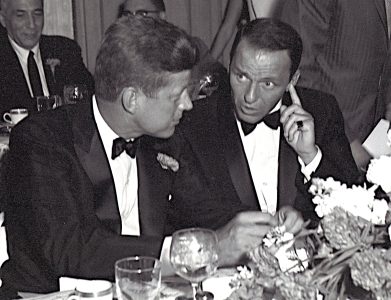
People are still wondering why the anemic, all-but-finished Sundance Film Festival is leaving Park City. It’s something to do with money, I realize, but what are the particulars?
Four days ago THR‘s Scott Feinberg reported that Boulder, Colorado may be the new host city of the Sundance Film Festival. Feinberg called it a “strong candidate.”
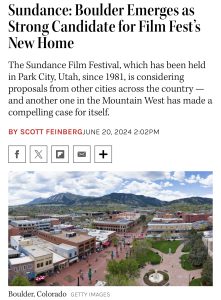
I re-read Feinberg’s piece this morning and was kinda flabbergasted by a paragraph that asks why Sundance is leaving in the first place. Feinberg implies that the reason is that because certain Utah laws are homophobic and transphobic.
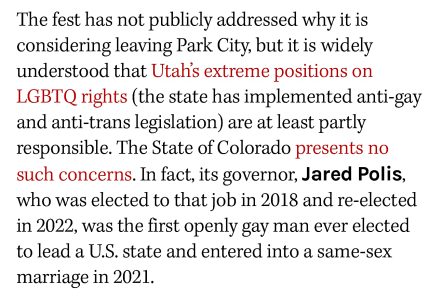
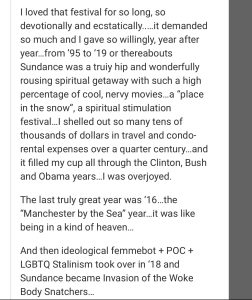
Friendo: “This is from your Knox Bronson post from yesterday…”
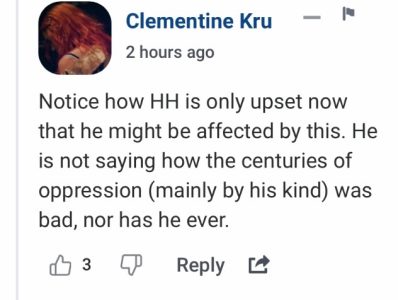
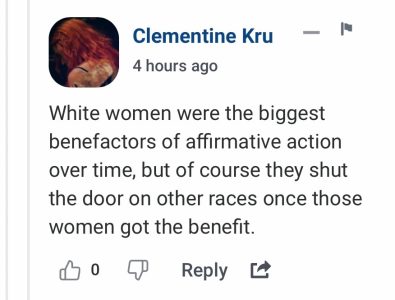
Friendo: “‘Mainly by his kind’ — meaning white men.
“And…
“White women ‘shut the door on other races.’
“Jeff, who the eff is this Clementine Kruczynski?
person? And why the eff is he/she so effing comfortable being racist??
“And why is nobody on the HE threads calling her out on it?”
After poking around the Walmart shoe section and having no luck, I flagged an overweight Walmart floor person.
HE: “May I ask a question? I’m looking for those soft shoe pads…you know, you slip them into your shoes for comfort?”
Floor person: “That aid udda shoedairsh.”
HE: “Shoe gain?”
Floor person: “No, sir — the shoe department.”
HE: “Aahh, thank you!”
There was no point saying that I’d already done a couple of laps around that department. There was only a sense of ennui, hopelessness. I finally found the pads upon my third try.
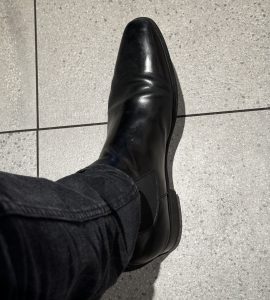
Obviously Robert Eggers’ Nosferatu (focus, 12.25) will be intense, highly impactful, etc. Hundreds of rats.
Bill “freakout” Skarsgård as Count Orlok. Nicholas Hoult and Lily-Rose Depp as Thomas Hutter. Aaron Taylor-Johnson and Emma “spikey dieky” Corrin as Friedrich and Anna Harding. Willem Dafoe as Professor Albin Eberhart Von Fran (i.e., Von Helsing or Peter Cushing)
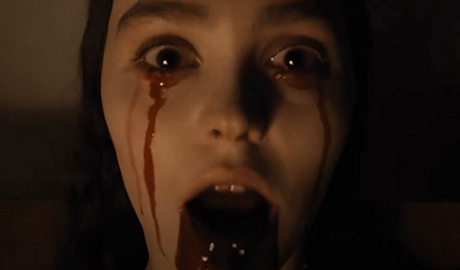
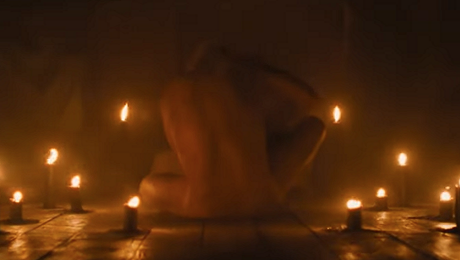
Greg Berlanti‘s Fly Me To The Moon (Sony, 7.12) is yet another riff on the alleged faking of the 1969 moon landing legend — a myth that has been kicking around for decades.
It would appear that this version, produced in part by star Scarlett Johansson, is light and bouncy and romcommy. Channing Tatum costars with Scarjo. I’m attending an invitationql Manhattan screening on Monday, 7.8.
Posted on 6.15.14: Last night’s Black List reading of Stepheny Folsom‘s 1969: A Space Odyssey, Or How Kubrick Learned to Stop Worrying and Land on the Moon was somewhere between okay and underwhelming. It was great to visit the Los Angeles theatre (which was built in 1931 or thereabouts) but the sound was imprecise and echo-y and ricocheting all over the large auditorium, and so I really couldn’t hear a good portion of the dialogue.
Plus the show began 45 minutes late, which is pretty close to unforgivable in my book unless you offer an apology once the show finally starts. (Nobody did.)
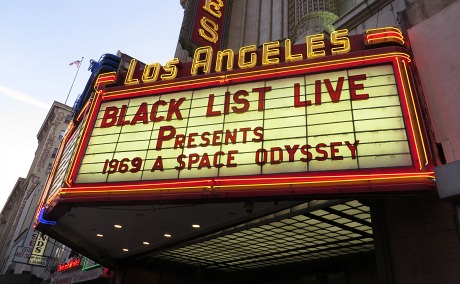
As for the script itself…well, I can only say that the reading didn’t feel like enough. It’s an amusingly crafted piece about a con job that never quite comes off, and about the natural disharmony between a bunch of Washington tap-dancers and flim-flammers and a genuine artist with a prickly personality.
All I got from it was a rat-a-tat-tat feeling. The applause was polite and perfunctory and that’s all.
Want my advice? Start the fucking show promptly next time.
I’ve seen a sliver of Luca Guadagnino’s Queer, and the thing that sticks out, as mentioned previously, is the sexually aromatic emotion that Daniel Craig conveys in the presence of his costar, Drew Starkey. We all associate a certain cool, impassive machismo with Craig’s James Bond persona, but the William S. Burroughs-like fellow he portrays in Queer is certainly not that. He’s almost gelatinous.
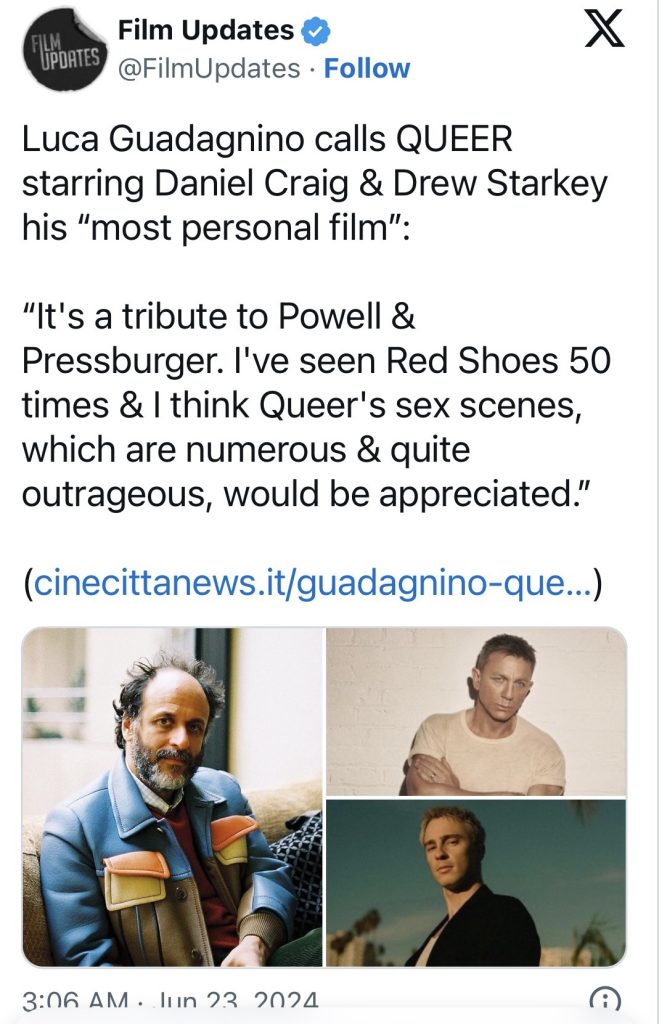
The unthinkable is a curious feeling about the late, highly notorious Roy Cohn, the merciless pitbull attorney and fixer whom some regarded as “evil incarnate.”
I felt it last month while watching Ali Abbasi‘s The Appprentice…a twinge of sympathy for Cohn…you feel just a bit sorry for the guy.
This morning I shared this emotional detour with director Matt Tyrnauer, creator of an excellent 2019 documentary about Cohn, called “Where’s My Roy Cohn?”
Here’s my five and a half year-old Sundance review.
HE to Tyrnauer: “I’m a huge fan of The Apprentice, which I saw last month on the Côte d’Azur. It’s right up your Roy Cohn alley, as you’ve no doubt read.
“The astonishing thing, for me, is that Abbasi’s film actually makes you feel a tiny bit sorry for Cohn when Sebastian Stan‘s Donald Trump more or less turns on him and essentially brushes him off after Cohn’s IRS troubles and AIDS affliction have taken their toll.
“For in so doing Trump violated a code of shady ethical conduct that was explained by William Holden’s Pike Bishop in The Wild Bunch: “When you side with a man you stick with him. Otherwise you’re like some animal…you’re finished!”
“I wouldn’t have thought that generating a certain measure of sympathy for one of the 20th Century’s most loathsome men would have been possible, but The Apprentice manages this.
“There’s also a faint measure of irony in the fact that The Apprentice portrays young Trump (the narrative begins in ‘73 or thereabouts when Trump is 27) as not altogether repugnant. He’s essentially portrayed as hungry and ambitious but not yet venal or rapacious.
“Stan’s Trump performance struck me as just right — never flirting with parody, not Alec Baldwin-ish, no cheap laughs. And for my money Jeremy Strong’s Cohn performance is drop-dead brilliant. He should be Oscar nominated for it.
“Okay, there’s one cheap laugh when, early in their mentor-apprentice relationship, Cohn says to Trump, ‘You have a fat ass — you should do something about that.’
“Have you seen it? Do you have friends who’ve seen it? I’d love to hear your specific reactions, etc.
“All hail Scotty Bowers in heaven!”
Friendo: “Although I didn’t sympathize with Cohn in the last part of The Apprentice, I found him weirdly likable. That’s the paradox of Roy Cohn. He was a vicious operator but he was kind of like Tony Soprano. He’s…compelling.”
HE to friendo: “All I was saying is that there’s a code of honor, even among fuckheads. If you accept big favors and counsel from someone and thereby rise in the world, even if he’s the devil himself, you don’t throw him under the bus when he’s going through hard times. You stick with him through thick and thin.
“Like Scorsese stuck with Elia Kazan.”
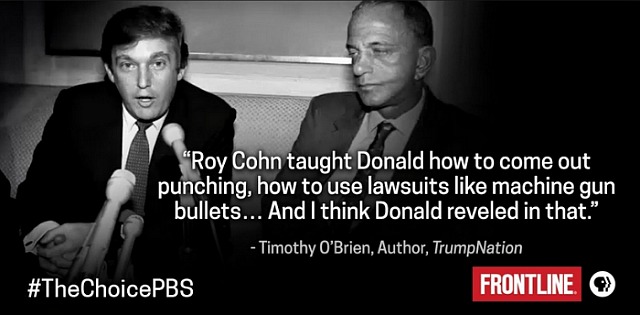
My January 2019 review of Where’s My Roy Cohn?:
“How can a study of the most notoriously ruthless attack-dog attorney in U.S. history be anything but a dark poem? A movie, I’m thinking, about ghosts, demons, banshees, goblins. A merging of fact and nightmare.
“The film is actually less poetic than a smart, sturdy, well-assembled thing — an efficient portrait of a closeted, scabrous, old-school shithead. It’s a fully respectable as far as it goes, but Cohn’s legend doesn’t feel all that linked or connected in the current zeitgeist. He was raised and shaped in another era, a darker time.
“The only element that vibrates is the fact that Donald Trump admired Cohn’s fang-toothed approach back in the day. Yes, Cohn was an inspiration to the youngish Trump in the ’60s, ’70s and ’80s, but Trump’s hyper-aggressive approach to the rough and tumble of big-time politics, looking to exploit whatever fears and anxieties might be lying around…well, we knew that going in.
“How absorbing is Where Is My Roy Cohn? — how sharply assembled, how hard-htting? Very, but at the same time it never really sheds its skin and transforms itself into something you might not see coming. I’m sorry but I didn’t enjoy it as much as Tyrnauer’s Scotty and the Secrets of Hollywood or Studio 54 docs, both of which were released last year.
“Cohn was a cold, bloodless, out-for-numero-uno creep, and seemingly a drag to be around. As a subject, I mean, as well as in real life.
“I guess I was looking for some kind of crazier current, maybe something borrowed from the realm of Mike Nichols‘ Angels in America. The film is “good,” as far as that goes. Tyrnauer is a gifted, highly intelligent filmmaker. I have no complaints with what it is — I just wish it had unfolded in a loopier, less conventional way.”
…I was imagining that my wrists had been slit and I was slowly bleeding to death.
It wasn’t a matter of Annie Baker’s directorial talent or a lack of…it was a matter of my own personal misery….a feeling of being drained to death.
Janet Planet is not, as IndieWire ‘s Harrison Richlin has passively noted, an “understated gem.”
And it is not, as New Yorker critic Justin Chang has written, “wondrous”.
It is the kind of delicate, soft-spoken, slow-moving film that some of us adore hating.
And yet hours after seeing JP in Telluride I was seized by an instinct to sidestep and go easy. And so I simply wrote…

A few days earlier a journalist friendo had shared the following:
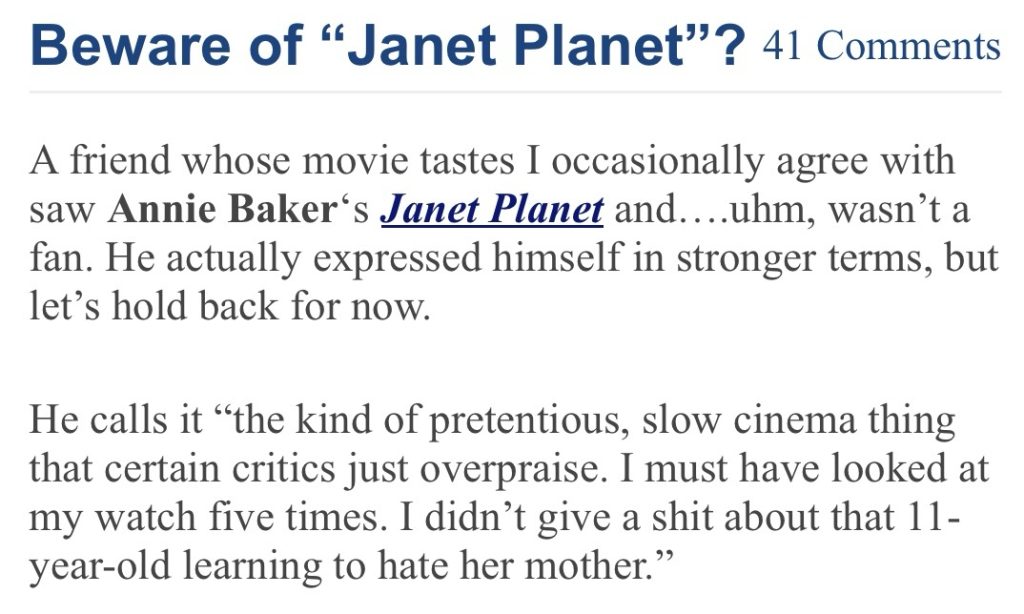
I don’t feel any particular animosity toward Janet Planet star Julianne Nicholson; nor do I feel any discomfort about Nicholson feeling “under-used” and “under-appreciated.”
My reply to Nicholson is “if you’re going to make faint-pulse movies like Janet Planet, how do you expect people to respond…do you expect they’ll be excited?”
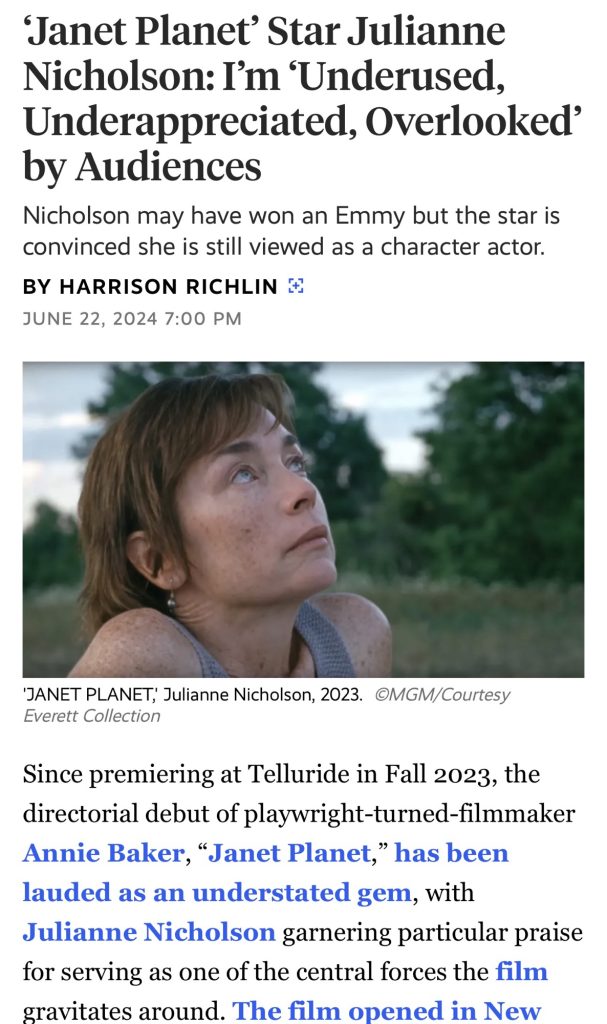
When you meet someone famous and widely admired, there’s only one way to play it, and that’s the low-key HE way…like you’re talking to a trusted mechanic about replacing a muffler.
I’m sorry but people who go “ooh! ooh!” are bad news.
“Oooh! Ooooh!”…how much will the muffler job cost? Oooh! I’ve dreamt about mufflers all my life…”oooh!”
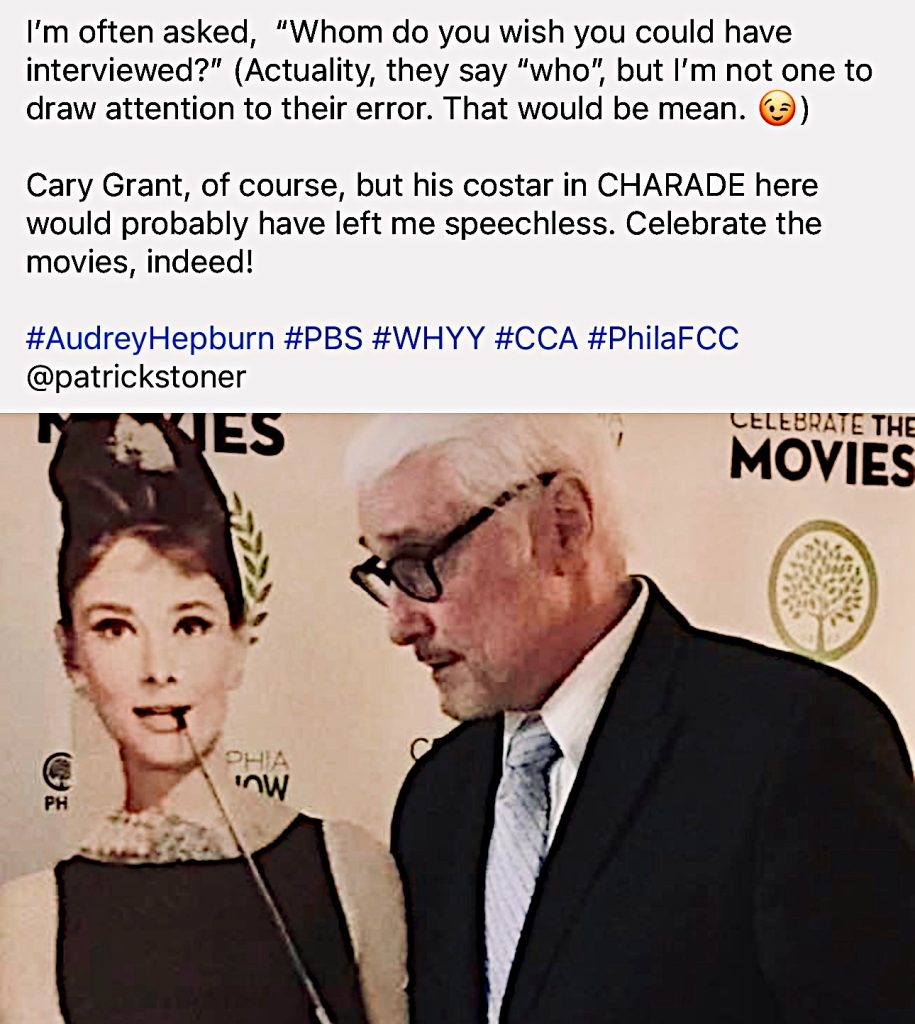

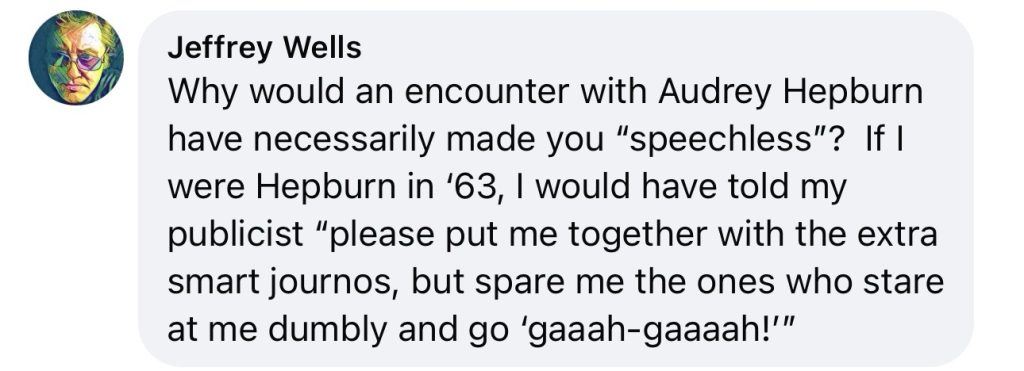
From Facebook comment thread reactions to Paul Schrader’s negative assessment of The Bikeriders.
This is it…this is the problem.
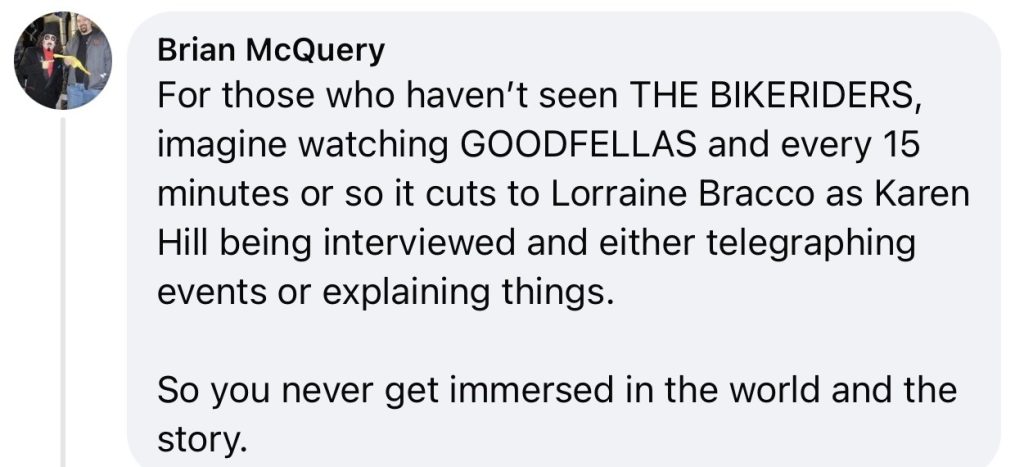

If Louis Gossett Jr.s’ Jeriba Shigan, a reptilian “drac” in Wolfgang Petersen‘s Enemy Mine (’85), was to attend a screening of The Bikeriders and watch it start to finish, he would raise his webbed hands after it ended and say, “That was a baalluuhderluhderluhderluhd moovie!”